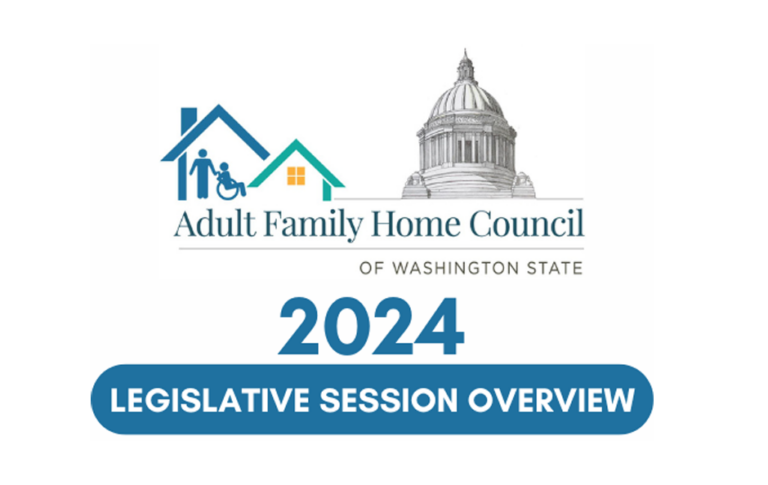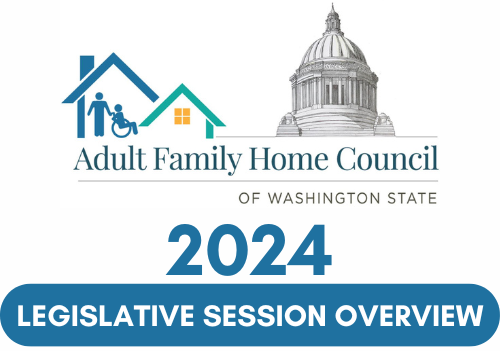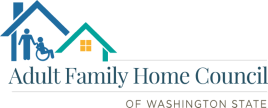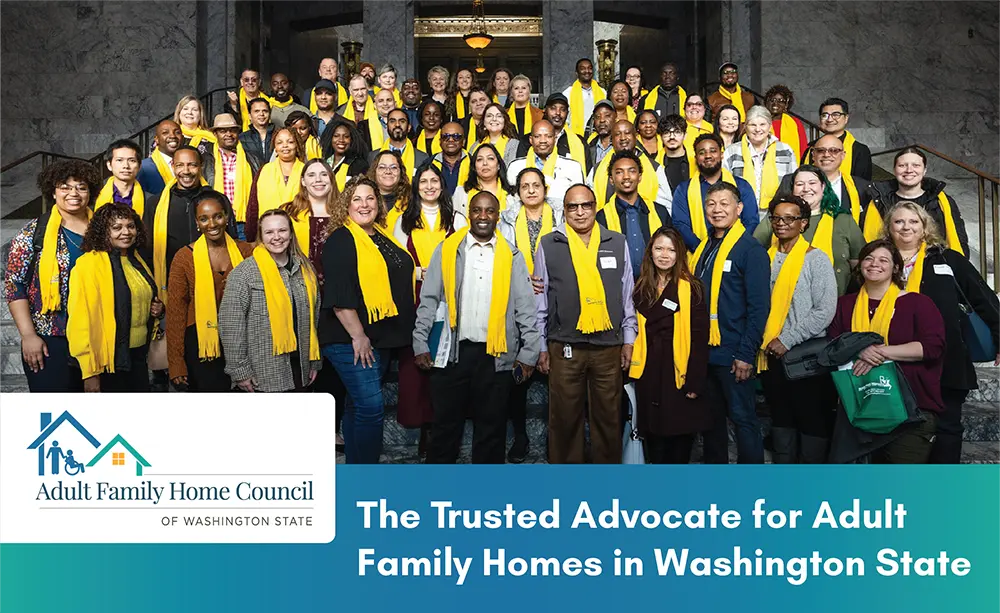
2024 Legislative Session Overview

2024 Legislative Session Overview
Dear Providers,
We want thank you all once again for your active engagement this legislative session! It has been amazing to see you all advocate for yourselves whether signing in pro/con, attending lobby day, emailing your lawmakers, and personally testifying on issues that matter to you. We look forward to working with all of you during the interim to continue to identify issues affecting adult family homes and using the appropriate channels to advocate on your behalf.
With that being said, this year’s legislative session formally ended on Thursday, March 7, 2024, which means we can now update all of you on bills that have passed and policy issues that made it on the final budget. An overview is provided below.
Please email any questions to Amina Abdalla at amina@adultfamilyhomecouncil.org
BILLS — AFH Council Legislative Priorities
HB 1859 Long-Term Care Residents (DIED)
- Extends federal skilled nursing home rights to all long-term care facilities including adult family homes:
- Requires facilities to accept all potential residents regardless of payment source.
- Requires facilities to establish a resident council.
- Requires facilities to identify a Grievance Official.
- Extends appeals on transfer and discharges.
- Resets 30-day discharge notice if there is a change in location.
- Allows the return of a resident to an AFH from a hospital even if a discharged noticed was issued and provider cannot meet the care needs of the resident.
- In addition to a discharge notice, a transfer notice must also be issued if a resident is transferred to another location regardless of reason.
- Broadens the length of time and the residents’ ability to appeal a discharge for issues like non-payment, inability to meet care needs, etc.
- Although the AFH Council is excited to not see this bill move forward this session, we do expect another version of this bill to be reintroduced in the next legislative session. With the reintroduction of HB 1859, we hope to focus the conversation on appeals and discharges. Appeals and discharges are currently happening now in adult family homes so defining this process in law would improve the current arbitrary application of nursing home regulations that we’ve seen from OAH and create protections for AFH providers.
HB 2347 Adult Family Home Information (PASSED)
- Modifies the content of the consumer-oriented website outlined in RCW 70.128.280 by removing unsubstantiated allegations and minor infractions from investigations posted online. The following is a list of documents the department will be required to post online:
- Deficiency-free inspection letters
- Statement of deficiency related to inspection visits.
- Statement of deficiency related to complaint investigations requiring an attestation of correction.
- Notice of return to compliance
- Enforcement action notices issued by the department.
- HB 2347 unanimously has passed the legislature and is currently at the governor’s desk waiting for a signature. It will go into effect June 6, 2024.
HB 2015 Adult Family Home Capacity (PASSED)
- Expedites the inspection process for adult family home providers wanting to expand to a 7th or 8th bed by doing the following:
- the Requires DSHS RCS to complete an adult family home’s first annual inspection as soon as they receive the application if the home has met all the other necessary requirements.
- Requires DSHS RCS to complete an adult family home’s second annual inspection 6 months after the completion of the first inspection.
PASSED. HB 2015 unanimously has passed the legislature and is currently at the governor’s desk waiting for a signature. It will go into effect as soon as it’s signed.
BUDGET — AFH Council Legislative Priorities
1915(i) Community Behavorial Health Services (FUNDED)
- $24,661,000 of the general fund—state appropriation for fiscal year 2025 and $26,931,000 of the general fund—federal appropriation are for implementing supportive supervision and oversight services in adult family home settings in accordance with and contingent upon execution of the collective bargaining agreement negotiated between the state and the adult family homes and referenced in part IX of this act.
Liability Insurance Workgroup (FUNDED)
- $400,000 of the insurance commissioner’s regulatory account—state appropriation is provided solely for the commissioner to convene and chair an adult family home liability insurance workgroup. The workgroup is required to do the following:
- Review the availability and cost of liability insurance for adult family homes;
- Identify obstacles to adult family homes access to liability insurance including underwriting restrictions, market conditions, as well as legal and regulatory requirements;
- Evaluate the financial risk to adult family homes, their residents, the state Medicaid program, and others that exist as a result of the increased cost of insurance, or in the event adult family homes are uninsured due to a lack of access to coverage; and
- Make policy recommendations to improve access to liability insurance coverage for adult family homes.
Private Duty Nursing (FUNDED)
- $361,000 of the general fund—state appropriation for fiscal year 2025 and $387,000 of the general fund—federal appropriation are provided for rates paid, effective January 1, 2025, to independent contractor nurses and agency-employed nurses providing private duty nursing, skilled nursing, and private duty nursing in adult family homes.
- Private duty nursing services in an adult family home shall be $898.95 per day.

